Online Course Catalog
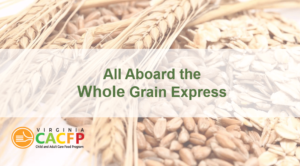
All Aboard The Whole Grain Express! (VDH-515)
With a destination of great nutrition and better lifestyles, learning how to incorporate whole grains into your CACFP menu can be a journey. In this one-hour session, participants will punch their ticket and board the whole grain express train, learning about where whole grains come from, how to incorporate them into their menu, and best practices for the preparation methods.
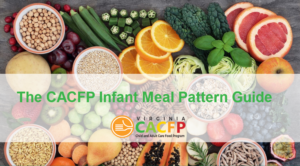
The CACFP Infant Meal Pattern (VDH-606)
One of the hardest parts of planning a CACFP menu is understanding if a food is creditable or not and how much you need to serve. In this brief overview, participants will learn about tools to guide them to determine if an infant food is creditable to the CACFP meal pattern, and how much they need to serve to be in compliance.

Sponsor Monitoring (VDH-609)
This course reviews monitoring requirements, staffing, completing monitoring reports, and conducting the five-day reconciliation.
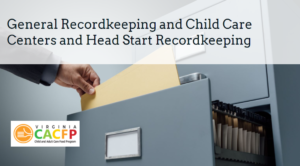
General Recordkeeping and Child Care Centers and Head Start Recordkeeping (VDH-611)
This course focuses on general CACFP recordkeeping requirements in lesson 1. In lesson 2 recordkeeping for Child Care Centers and Head Start programs will be discussed. The course addresses program eligibility, operational requirements, enrollment, participant eligibility, and miscellaneous recordkeeping requirements.

Navigating Special Dietary Needs (VDH-512)
CACFP sponsors may need to modify planned meals in order to accommodate participants with disabilities or special dietary needs. This course summarizes the responsibilities sponsors have when accommodating participants’ meal requests. The course also discusses medical statements, meal pattern requirements, and accommodating non-disabling special dietary needs.

Crediting Foods in the CACFP (VDH-605)
This course goes into detail on crediting foods in the CACFP. The course discusses Child Nutrition labels, Product Formulation Statements, and standardized recipes.

CACFP Enrollment (VDH-602)
This course covers the enrollment process for applicable programs, completed Enrollment Forms, and annual update requirements.
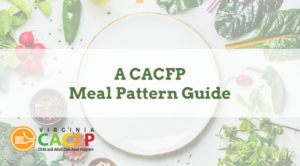
A CACFP Meal Pattern Guide (VDH-603)
One of the hardest parts of planning a CACFP menu is understanding if a food is creditable or not and how much you need to serve. In this brief overview, participants will learn about tools to guide them to determine if a food is creditable to the CACFP meal pattern, and how much they need to serve to be in compliance.
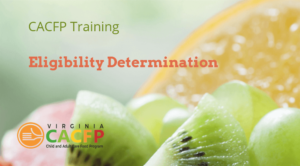
Eligibility Determination (VDH-601)
Income Eligibility Forms (IEFs) are required to determine the free, reduced-price, and paid eligibility categories for CACFP participants. This course reviews IEF requirements, demonstrates determining income eligibility, and discusses annual update requirements.
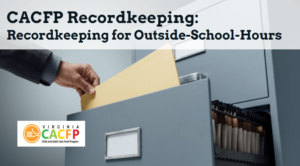
General Recordkeeping and Recordkeeping for Outside School Hours (VDH-613)
This course focuses on general CACFP recordkeeping requirements in lesson 1. In lesson 2 recordkeeping for Outside School hours. The course addresses program eligibility, operational requirements, enrollment, participant eligibility, and miscellaneous recordkeeping requirements.
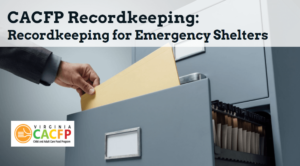
General Recordkeeping and Recordkeeping for Emergency Shelters (VDH-614)
This course focuses on general CACFP recordkeeping requirements in lesson 1. In lesson 2 recordkeeping for Emergency Shelters will be discussed. The course addresses program eligibility, operational requirements, enrollment, participant eligibility, and miscellaneous recordkeeping requirements.
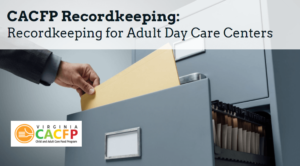
Adult Day Care Recordkeeping (VDH-615)
This course focuses on CACFP recordkeeping requirements for Adult Day Care programs. The course addresses program eligibility, operational requirements, enrollment, participant eligibility, meal pattern flexibilities, and miscellaneous recordkeeping requirements.
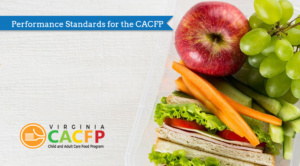
CACFP Performance Standards 2023 (VDH-130)
CACFP regulations require that all new and participating CACFP institutions meet and maintain compliance with the three Performance Standards; Financial Management and Viability, Administrative Capability, and Program Accountability. This course is designed to guide CACFP institutions to better understand the importance of the Performance Standards, the reason that they were developed, and the criteria used to determine compliance.

VCA and Internal Controls: Evaluating Compliance with the Performance Standards 2023 (VDH-131)
To protect the integrity of the Child and Adult Care Food Program (CACFP), 7 CFR 226, the CACFP Regulations, require the state agency to develop factors for all new and participating institutions to determine their compliance with the Performance Standards, also called VCA: Viability, Capability, and Accountability. VCA and Internal Controls: Evaluating Compliance with the Performance Standards assists institutions in making this determination by providing guidelines for institutions to identify the documentation necessary to demonstrate their on-going compliance. The course will also discuss ways for institutions to adopt internal controls that will allow them to maintain and improve VCA.
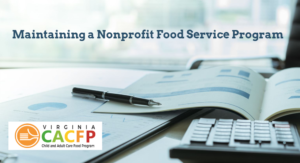
Maintaining a Non-Profit Food Service Program 2023 (VDH-132)
All CACFP sponsors must maintain a nonprofit food service program. This course includes two lessons that cover the evaluation of program revenue and expenses, financial recordkeeping and controls, and expectations with operating a nonprofit CACFP.
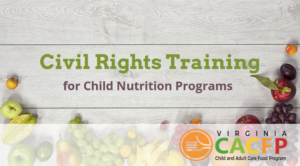
Civil Rights Training 2023 (VDH-150)
Program institutions and facilities receiving federal financial assistance are required to comply with federal civil rights laws to ensure all Child Nutrition participants have equal access to all benefits and services. This course will review Civil Rights regulations, and provide all information necessary to ensure that your program is in compliance with these requirements.
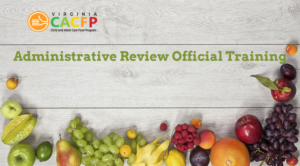
Appeals and Administrative Review Official Training 2023 (VDH-160)
The Administrative Review Officer training course responds to USDA's recommendation to train all administrative review officers on appeal processes for the CACFP. For agencies not able to provide direct training, this course will assist with training Administrative Review officers through testimony or documents submitted for review.

